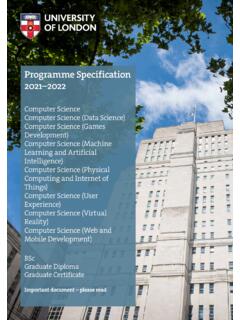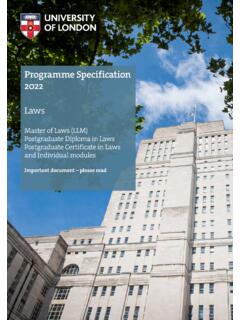Transcription of Undergraduate programmes in Law - University of London ...
1 2021 Undergraduate programmes in LawWith academic direction from the Laws World class. the World Class1 Quality of learningThe law programmes in this prospectus have been developed by academics at six of the University of London law schools, ensuring the world-class quality of the without relocatingFit your studies around your work and your personal commitments. Study wherever you live and at a time that suits at your convenienceChoose from different entry points depending on your qualifications including fast-track routes for your employability by developing skills such as problem-solving, critical thinking and self-discipline, all of which are valued by top law firms and employers Join the World ClassAfter graduation, you become part of our global network of influential alumni, including distinguished barristers, solicitors, leaders in industry and Nobel prize winners. Undergraduate programmes in Law2 In a fast changing environment of worldwide access to higher education, a University of London degree continues to offer a guarantee of quality, value and intellectual rigour.
2 Professor Wendy Thomson Vice-Chancellor, University of prestigious University of London qualificationAbout your qualificationWhen you graduate with a degree, diploma or certificate from the University of London , you will receive two important documents your Final Diploma (the parchment you receive on graduation) and a Diploma Final Diploma Indicates that you were registered with the University of London and awarded a University of London degree, diploma or certificate. States that University of London law schools developed the syllabus and provided assessment. Features the University of London crest and the Vice-Chancellor s Diploma Supplement Describes the nature, level and content of the programme you successfully completed. Includes the transcript of courses taken, marks achieved and overall classification. States the names and roles of the University of London law schools and the method of programmes in Law4 Key datesFull academic year (two semesters), up to four modules:Apply by: 1 October*Register by: 1 NovemberHalf academic year (one semester), up to two modules:Apply by: 1 April*Register by: 1 MayExaminations:May/June and October Certificate of Higher Education in Common Law (CertHE Common Law):CertHE Common Law students and those who wish to receive support for the LLB from a Recognised Teaching Centre should contact the teaching centre, which may require you to make an earlier application (see page 20).
3 * Dates apply to LLB and Graduate Diploma in Commercial Law the World Class 2 Your prestigious University of London qualification 4 Welcome to our global Law qualifications 6 The Laws Consortium 8 Studying with Undergraduate Laws 9 ProgrammesHow you study 12 LLB structures 15 Graduate Diploma in Commercial Law 16 Certificate of Higher Education in Common Law 17 Entry into the Legal Profession 18 ReferenceEntrance requirements 19 Application and registration process 20 Further information programmes in Law6 Welcome to our global Law qualificationsWhy study with us?In a world where degrees and degree providers are proliferating, the University of London LLB offers the security of an internationally recognised University of London was the first University to offer a degree in English law, in the 1890s. The high reputation of our LLB has been maintained because our students are marked to the same high standards whether they are campus-based or studying by distance and flexible learning.
4 Upon graduation, you will join a distinguished group of lawyers, solicitors, barristers and judges from around the world who have obtained their law degree through the University of to become a legal practitioner is not the only reason for studying for a legal qualification. You might already be working in a law-related field in the police force or social work, for example and want to enhance your legal knowledge and professional standing. Your career path might lie in the commercial or financial professions, where legal qualifications are highly valued not only for a specific knowledge of law but also because of the transferable skills that come from the study of law, such as creating reasoned arguments and problem your reasons for study, applying yourself to studies in law will provide a stimulating and challenging University of London degreeUndergraduate degrees of the University of London are awarded with Honours.
5 The award certificate will indicate the level of the academic performance (Honours) achieved by classifying the award. The classification of the degree will be based on the ratified marks from the completed assessments. The standard classification system for bachelor s degrees with Honours is: First Class Upper Second Class Lower Second Class Third ClassA Pass Degree or Ordinary Degree is a degree without Honours. Specific rules for the classification of awards are given in the Programme Regulations, under Schemes of AskeyDean, Undergraduate Laws Most people choose to study law thinking that they ll become a lawyer but the skills you ll gain studying law researcher communicator logical problem-solver are a springboard for many professions in commerce and industry. A law degree is a well-respected Undergraduate qualification and studying law is an opportunity to explore everything from economics in Contract and Commercial law, politics and policies in Public and Public international law and sociology and psychology in Criminal and Family law.
6 Undergraduate programmes in Law8 The Laws ConsortiumThe law schools or departments of the following Colleges of the University of London provide the academic direction for the University of London Undergraduate Laws qualifications. Collectively, they are known as the Laws in 1823, Birkbeck is unique in its special mission to enable mature students to gain higher education qualifications via part-time study. s College LondonEstablished in 1829, King s College London has been responsible for some of the discoveries that have shaped the modern world. 1895, LSE (The London School of Economics and Political Science) has been regarded as an international centre of academic excellence and innovation in the social sciences. Mary University of LondonQueen Mary is one of the largest Colleges of the University . Now heralded for its quality research efforts, it began life in 1887 as the People s Palace, a philanthropic endeavour to provide East Londoners with education.
7 Is the world s largest centre for the study of Asia, Africa and the Middle East. Founded in 1916, it has built a reputation for its regional expertise and the calibre of its cross-disciplinary social sciences, arts and humanities programmes . in 1826, UCL was the first University in England to admit students of any race, class or religion, and the first to welcome women on equal terms with men. with Undergraduate LawsAn internationally recognised qualificationIf you want to achieve an internationally recognised qualification in law, where you can study at a pace that suits you, then you need look no further than the University of Laws is committed to: Offering expert guidance. Our study materials are informed by current research and scholarship and engage with contemporary legal issues. Providing a wealth of resources. With our Online Library and Laws Virtual Learning Environment (VLE), you will have a resource-rich learning environment to develop your legal research skills.
8 Promoting independent learning. Through the guidance provided in your study materials, we will support you in developing your capacity to manage your own studying with us you will: Acquire knowledge and understanding of the foundation subjects of common law. Learn to analyse and critically evaluate legal and relevant non-legal primary and secondary materials. Learn how to stand back and consider the bigger picture , and develop an awareness of the context of law. Develop transferable skills of research, problem-solving and further information about what to expect when undertaking a law module, please visit our website: LLB routesFor those studying at Undergraduate level for the first time:Standard Entry LLB Complete 12 modules in a minimum of three years and a maximum of six those who already have a three-year Undergraduate degree:Graduate Entry LLBC omplete nine modules in a minimum of two years and a maximum of six programmes in Law10 Flexible study The academic year for the LLB, Graduate Diploma in Commercial Law and Certificate of Higher Education in Common Law (CertHE Common Law) begins on 1 November each year and ends on 31 are two opportunities to apply each academic year (CertHE Common Law students should check with their teaching centre).
9 The deadlines are: 1 October and 1 AprilThere are two opportunities to register each academic year (CertHE Common Law students should check with their teaching centre). The deadlines are: 1 November and 1 MayThere are two examination opportunities each academic year: May/June and OctoberStudents have flexibility to split their examinations over two sessions in the academic year (subject to a maximum of two examinations in an October session). If you register by 1 November, you can sit examinations in a maximum of four modules in your first year of study. If you register by 1 May, you can sit examinations in a maximum of two modules in to the awardsAwardNo. of modulesStudy periodDescriptionCertificate of Higher Education in Common Law41 5 yearsAn award in its own right. Alternatively, on passing three modules, including Legal system and method, you may transfer to the Standard Entry Diploma in Commercial Law41 5 yearsProvides a grounding in the principal features of the English legal system pertaining to commercial Entry LLB123 6 yearsThe degree suitable for those who meet the general entrance requirements.
10 Graduate Entry LLB92 6 yearsThe degree suitable for those who already have an Undergraduate degree. Exit awards: BA in Law; Diploma of Higher Education in Law; Certificate of Higher Education in Law Students who are unable to continue their studies may be able to exit with an award that reflects their achievements and efforts. You cannot apply for direct entry into these through your LLB studiesIn the first year, all Standard Entry LLB students must study and pass Legal system and method, and Graduate Entry students must study and pass the online course Introduction to English law. Your progression route is determined by the profession that you wish to enter into after completing your degree see page all modules, except the Dissertation, assessment is primarily by three-hour examinations. These are held in May/June and October at local centres in over 190 different countries as well as in examination scripts are marked by University of London approved format and mode of assessment for this programme may change due to events or circumstances beyond our control.










